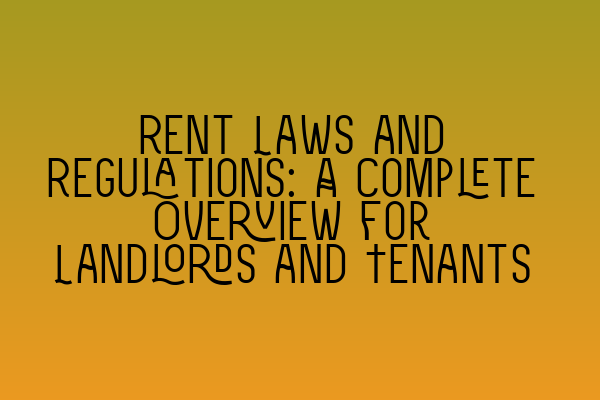Rent Laws and Regulations: A Complete Overview for Landlords and Tenants
Welcome to SQE Property Law & Land Law! As an expert solicitor in the field, I understand that navigating the intricate world of rent laws and regulations can be quite daunting for both landlords and tenants. It’s essential to have a comprehensive understanding of the legal framework surrounding rental properties to ensure a smooth and lawful tenancy.
In this blog post, I will provide you with a complete overview of rent laws and regulations, covering everything you need to know as a landlord or tenant. So let’s dive in!
The Landlord’s Responsibilities
As a landlord, it is crucial to understand your legal obligations towards your tenants in order to avoid any legal complications. Here are some key responsibilities you must fulfill:
- Providing a safe and habitable property: Landlords are legally required to ensure that the rented property is free from hazards and meets health and safety standards.
- Maintaining the property: It is your responsibility to carry out necessary repairs and maintenance work to keep the property in good condition.
- Protecting the tenant’s deposit: When you receive a deposit from your tenants, you are obligated to protect it in a government-approved deposit protection scheme.
- Respecting the tenant’s privacy: Landlords must give reasonable notice before entering the rental property and should only do so for specific reasons outlined in the tenancy agreement.
To learn more about your responsibilities as a landlord, you can read our comprehensive guide on SQE 1 Practice Exam Questions.
The Tenant’s Rights
As a tenant, you have certain rights that protect you during your tenancy. Here are some key rights that you should be aware of:
- Right to a safe and habitable property: Landlords are obligated to provide tenants with a property that is in good condition and free from hazards.
- Right to privacy: Tenants have the right to enjoy their rented property without unnecessary intrusion from the landlord.
- Right to a written tenancy agreement: It is your right as a tenant to receive a written agreement that clearly outlines the terms and conditions of the tenancy.
- Protection against eviction: Tenants have legal protections against unfair eviction, ensuring that they cannot be evicted without proper notice and valid reasons.
If you want to know more about your rights as a tenant, check out our detailed article on SQE 1 Practice Mocks FLK1 FLK2.
Types of Tenancy Agreements
There are different types of tenancy agreements that landlords and tenants can enter into. It’s important to understand the differences between them to ensure that both parties are aware of their rights and responsibilities. Here are some common types of tenancy agreements:
- Assured Shorthold Tenancy (AST): This is the most common form of tenancy agreement used in the private rental sector. It provides tenants with a minimum term of six months and certain legal protections.
- Fixed-Term Tenancy: This type of agreement specifies a fixed term for the tenancy, usually for a year. It provides stability for both the landlord and the tenant.
- Periodic Tenancy: A periodic tenancy does not have a fixed end date and continues on a rolling basis, typically month to month. This provides flexibility for both parties.
To learn more about the different types of tenancy agreements and which one is suitable for your situation, take a look at our informative guide on SQE 2 Preparation Courses.
Dispute Resolution
Disputes between landlords and tenants can arise, but it’s essential to handle them in a fair and lawful manner. Here are a few steps you can take to resolve disputes:
- Open communication: Start by discussing the issue with the other party and try to find a mutually acceptable solution.
- Mediation: If communication fails, you can consider mediation, where a neutral third party helps facilitate a resolution.
- Tribunals and Courts: If all else fails, you may need to seek legal action or take the matter to a tribunal or court for a final decision.
For more information on resolving disputes between landlords and tenants, refer to our helpful article on SQE 1 Preparation Courses.
Stay Updated with Rent Laws and Regulations
Rent laws and regulations are subject to change, and it’s crucial for both landlords and tenants to stay updated with any amendments. This ensures that you are always aware of your rights and responsibilities. Keep an eye on the SRA SQE Exam Dates to know when any significant changes are expected.
In conclusion, understanding rent laws and regulations is vital for both landlords and tenants to maintain a lawful and harmonious tenancy. By knowing your rights and responsibilities, you can protect yourself and ensure a positive rental experience. If you have any questions or need assistance with any legal matters, feel free to contact SQE Property Law & Land Law for expert guidance.
